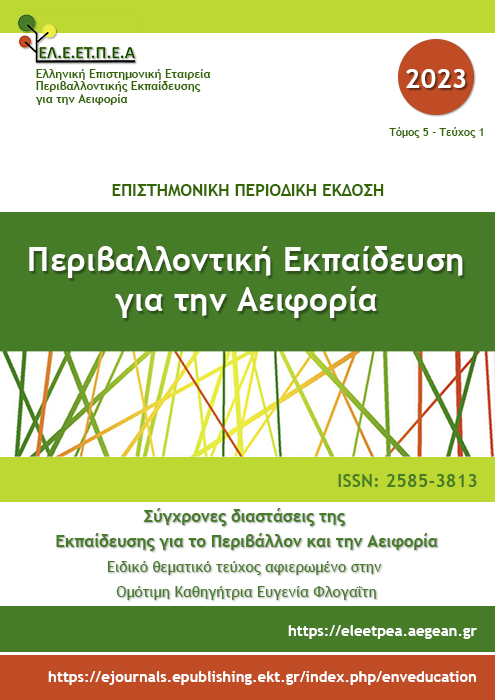Η πολυπλοκότητα των περιβαλλοντικών προβλημάτων και η αναγκαιότητα καλλιέργειας της συστημικής σκέψης στο πλαίσιο της Εκπαίδευσης για το Περιβάλλον και την Αειφορία
Abstract
Τα περιβαλλοντικά προβλήματα είναι ιδιαίτερα πολύπλοκα, καθώς προκύπτουν από την αλληλεπίδραση σύνθετων συστημάτων. Η αποτελεσματική προσέγγισή τους, χωρίς την ανάπτυξη της συστημικής σκέψης είναι αδύνατη, αφού πρέπει να κατανοηθούν οι διαδραστικές σχέσεις που τα προκαλούν. Το ιδανικό συστημικό πλαίσιο εντός του οποίου μπορούν να μελετηθούν είναι της αειφορίας, η οποία ως συστημική έννοια, συνιστά έναν νέο τρόπο μακροπρόθεσμης σκέψης κατάλληλο για την ολιστική προσέγγιση των σύνθετων προβλημάτων που καλείται να αντιμετωπίσει η ανθρωπότητα. Για την επίτευξη των στόχων της καθοριστικός θεωρείται ο ρόλος της Εκπαίδευσης για το Περιβάλλον και την Αειφορία (ΕΠΑ). Ωστόσο, η σημερινή πραγματικότητα της ΕΠΑ καταδεικνύει ότι η προσέγγιση των περιβαλλοντικών θεμάτων παραμένει, στις περισσότερες των περιπτώσεων μονοδιάστατη και γραμμική. Τα περισσότερα σχολικά προγράμματα της ΕΠΑ εστιάζουν στις περιβαλλοντικές διαστάσεις των προβλημάτων και συνήθως δεν γίνονται οι απαραίτητες διασυνδέσεις με τα οικονομικά και κοινωνικά, ή και όταν γίνονται, είναι γενικόλογες και ασαφείς. Η ΕΠΑ στο παιδαγωγικό της πλαίσιο περιλαμβάνει συμμετοχικές μεθόδους διδασκαλίας, τις οποίες καλείται να αξιοποιήσει, για να καλλιεργήσει τη συστημική σκέψη και να την εφαρμόσει στην εκπαιδευτική πράξη, προκειμένου να συμβάλει στην αλλαγή του τρόπου που σκέπτονται οι μαθητές/τριες, άρα και πώς ενεργούν, ώστε να βοηθήσουν στην επίτευξη των 17 αλληλένδετων στόχων της αειφόρου ανάπτυξης.
Article Details
- Come citare
-
Παπαβασιλείου Β. (2023). Η πολυπλοκότητα των περιβαλλοντικών προβλημάτων και η αναγκαιότητα καλλιέργειας της συστημικής σκέψης στο πλαίσιο της Εκπαίδευσης για το Περιβάλλον και την Αειφορία. Περιβαλλοντική Εκπαίδευση για την Αειφορία, 5(1), 95–107. https://doi.org/10.12681/ees.35765
- Sezione
- Articles

Questo lavoro è fornito con la licenza Creative Commons Attribuzione - Non commerciale - Condividi allo stesso modo 4.0 Internazionale.
Οι συγγραφείς διατηρούν τα πνευματικά δικαιώματα και παρέχουν στο περιοδικό το δικαίωμα της πρώτης δημοσίευσης μαζί με την αδειοδότηση της εργασίας με CC-BY-NC-SA, που επιτρέπει σε άλλους να μοιράζονται αυτή την εργασία με αναγνώριση του συγγραφικού δικαιώματος και την αρχική δημοσίευση σε αυτό το περιοδικό.


